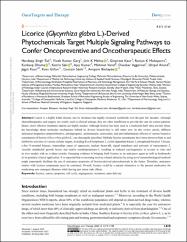Licorice ( Glycyrrhiza glabra L.)-Derived Phytochemicals Target Multiple Signaling Pathways to Confer Oncopreventive and Oncotherapeutic Effects

View/
Date
2022Author
Tuli, Hardeep SinghGarg, Vivek Kumar
Mehta, Jinit K.
Kaur, Ginpreet
Mohapatra, Ranjan K.
Varol, Mehmet
Metadata
Show full item recordCitation
Tuli HS, Garg VK, Mehta JK, Kaur G, Mohapatra RK, Dhama K, Sak K, Kumar A, Varol M, Aggarwal D, Anand U, Kaur J, Gillan R, Sethi G, Bishayee A. Licorice (Glycyrrhiza glabra L.)-Derived Phytochemicals Target Multiple Signaling Pathways to Confer Oncopreventive and Oncotherapeutic Effects. Onco Targets Ther. 2022 Nov 30;15:1419-1448. doi: 10.2147/OTT.S366630. PMID: 36474507; PMCID: PMC9719702.Abstract
Cancer is a highly lethal disease, and its incidence has rapidly increased worldwide over the past few decades. Although chemotherapeutics and surgery are widely used in clinical settings, they are often insufficient to provide the cure for cancer patients. Hence, more effective treatment options are highly needed. Although licorice has been used as a medicinal herb since ancient times, the knowledge about molecular mechanisms behind its diverse bioactivities is still rather new. In this review article, different anticancer properties (antiproliferative, antiangiogenic, antimetastatic, antioxidant, and anti-inflammatory effects) of various bioactive constituents of licorice (Glycyrrhiza glabra L.) are thoroughly described. Multiple licorice constituents have been shown to bind to and inhibit the activities of various cellular targets, including B-cell lymphoma 2, cyclin-dependent kinase 2, phosphatidylinositol 3-kinase, c-Jun N-terminal kinases, mammalian target of rapamycin, nuclear factor-κB, signal transducer and activator of transcription 3, vascular endothelial growth factor, and matrix metalloproteinase-3, resulting in reduced carcinogenesis in several in vitro and in vivo models with no evident toxicity. Emerging evidence is bringing forth licorice as an anticancer agent as well as bottlenecks in its potential clinical application. It is expected that overcoming toxicity-related obstacles by using novel nanotechnological methods might importantly facilitate the use of anticancer properties of licorice-derived phytochemicals in the future. Therefore, anticancer studies with licorice components must be continued. Overall, licorice could be a natural alternative to the present medication for eradicating new emergent illnesses while having just minor side effects.

















